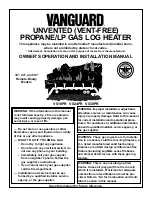
-6-
WARNING: Never leave the heater unattended while operating.
Disconnect the heater from its power source when not in use.
-7-
WARNING: Never leave the heater unattended while operating.
Disconnect the heater from its power source when not in use.
GENERAL INFORMATION
USA 8-Hr Time weighted average (OSHA
29 CFR 1926.55 App A)
Canada 8-hr time weighted average WorkSafe BC OHS Guidelines Part 5.1
and Ontario Workplaces Reg 833
CO
50 ppm
25 ppm
CO
2
5000 ppm
5000 ppm
NO
2
3 ppm (Reg 833)
USA – Ceiling Limit (Short Term
Exposure Limit = 15 minutes)
Canada STEL (15 minutes Reg 833/1 hour WSBC) WorkSafe BC OHS
Guidelines Part 5.1 and Ontario Workplaces Reg 833
CO
100 ppm
CO
2
15000 ppm (WSBC) 30000 ppm (Reg 833)
NO
2
5 ppm
1.0 ppm (WorkSafeBC) 5.0 ppm (Reg 833)
•
Ensure that the flow of combustion and ventilation air exchange cannot become obstructed.
•
As the building ‘tightens up’ during the construction phases ventilation may need to be increased.
FUEL GAS ODOR
LP gas and natural gas have man-made odorants added specifically for detection of fuel gas leaks. If a gas leak occurs you should
be able to smell the fuel gas. Since Propane (LP) is heavier than air you should smell for the gas odor low to the floor. ANY GAS
ODOR IS YOUR SIGNAL TO GO INTO IMMEDIATE ACTION!
•
Do not take any action that could ignite the fuel gas. Do not operate any electrical switches. Do not pull any power supply or
extension cords. Do not light matches or any other source of flame. Do not use your telephone.
•
Get everyone out of the building and away from the area immediately.
•
Close all propane (LP) gas tank or cylinder fuel supply valves, or the main fuel supply valve located at the meter if you use natural
gas.
•
Propane (LP) gas is heavier than air and may settle in low areas. When you have reason to suspect a propane leak, keep out of
all low areas.
•
Use your neighbor’s phone and call your fuel gas supplier and your fire department. Do not re-enter the building or area.
•
Stay out of the building and away from the area until declared safe by the firefighters and your fuel gas supplier.
•
FINALLY, let the fuel gas service person and the firefighters check for escaped gas. Have them air out the building and area
before you return. Properly trained service people must repair any leaks, check for further leakages, and then relight the
appliance for you.
ODOR FADING ‑ NO ODOR DETECTED
•
Some people cannot smell well. Some people cannot smell the odor of the man-made chemical added to propane (LP) or natural
gas. You must determine if you can smell the odorant in these fuel gases.
•
Learn to recognize the odor of propane (LP) gas and natural gas. Local propane (LP) gas dealers will be more than happy to give
you a scratch and sniff pamphlet. Use it to become familiar with the fuel gas odor.
•
Smoking can decrease your ability to smell. Being around an odor for a period of time can affect your sensitivity to that
particular odor. Odors present in animal confinement buildings can mask fuel gas odor.
•
The odorant in propane (LP) gas and natural gas is colorless and the intensity of its odor can fade under some circumstances.
•
If there is an underground leak, the movement of gas through the soil can filter the odorant.
•
Propane (LP) gas odor may differ in intensity at different levels. Since Propane (LP) gas is heavier than air, there may be more
odor at lower levels.







































